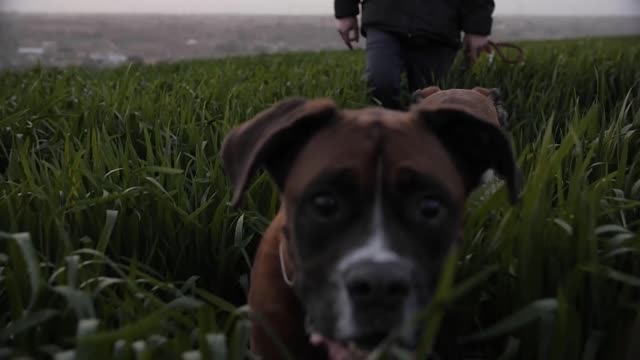Premium Only Content

Veterinary dentist understand the importance.
Veterinary dentist: understand the importance.
As important as bathing and grooming, maintaining regular appointments with a veterinary dentist is essential for the lives of pets. That's because treating pets' teeth relieves possible pain and brings benefits to your friend's oral health.
To help you better understand how veterinary dentistry works and what are the advantages of the specialty for your pet, we have prepared a very cool content. We also brought essential care tips, in everyday life with your pet, for it to grow stronger and healthier. Check out!
Diseases caused by bacteria and inflammation are responsible for 85% of problems in the oral cavity of pets, comments Dr. Mariana Lage, veterinarian and specialist, master and doctor in Veterinary Dentistry.
Do you know why this happens? According to the veterinarian, the lack of brushing is undoubtedly the main reason, given that, in a period of just 24 hours, the bacterial plate is already able to organize itself and turn into tartar.
The manifestation and development of periodontal diseases (i.e., close to the teeth) can vary according to some factors. They are: low immunity, breed of dog or cat, genetics and proportion of teeth in the mouth.
That's why it's very important to keep an eye out if your best friend is a dog with bad breath and tartar. If this happens, it is good to consult a dental vet.
To prevent periodontal diseases, it's interesting to maintain a pet's teeth care routine - since childhood, see? The Regional Council of Veterinary Medicine of the State of São Paulo (CRMV-SP) recommends brushing the animal's teeth daily.
In addition to the dog toothbrush, it is important to use a specific toothpaste for pets. It prevents the formation of tartar, fights bad breath, is specially made for the adaptation and comfort of pets.
To get your friend used to it, the essential tip is to start cleaning a dog's or cat's teeth from a young age. If your pet is older and you're still struggling, it's a good idea to start gradually and provide rewards such as petting or treats.
In addition to daily brushing, one way to maintain your dog's or cat's oral health is to maintain a proper diet, with rations that contain nutrients necessary for a healthier life. An alternative is to bet on a dental diet, guided and indicated by a veterinarian.
Another recommendation from the CRMV-SP is to offer toys that help to dislodge the plaque that forms on the teeth. It's also a pretty fun option for your friend, isn't it?
For all the above tips to be really effective, it is important that the pet undergoes consultations with the veterinary dentist annually or every six months. This makes it easier to check his oral health and prevent diseases.
In this evaluation, by means of an x-ray, it is possible to verify if all the pet's teeth are healthy and if there is the formation of tartar in dogs. If the answer is yes, it is possible to anesthetize the pet and clean it, preventing the problem from evolving and causing more serious consequences.
For the veterinarian, if the teeth are badly damaged, the extraction of some of them can be indicated to improve the pet's quality of life, in addition to ending possible pain and preventing the problem from becoming more extensive.
As a tutor, it is important to pay attention to possible signs and symptoms that something is not right with your pet's oral health. Some of them are: gingivitis in a dog, broken, loose or yellow teeth, tartar, excess drool, reduced appetite, pain around the mouth, swelling or bleeding.
If you notice any of them, see a veterinary dentist right away! The bacterial infection can reach your pet's bloodstream, which is dangerous for his overall health. Among the problems caused by lack of oral hygiene are: hepatitis, kidney, heart and joint problems.
-
 LIVE
LIVE
BlackDiamondGunsandGear
8 hours agoAFTER HOURS ARMORY w/ DLD & John from GOA & FLR
490 watching -
 1:05:28
1:05:28
Man in America
9 hours agoTREASON? Obama, Hillary, and Soros in the New World Order Agenda EXPOSED w/ Mel K
59.7K44 -
 2:22:46
2:22:46
The Connect: With Johnny Mitchell
10 hours ago $1.35 earnedOne Man's Mission To Stop Human Trafficking: How A Billionaire Mercenary Saved Hundreds Of Children
10.3K4 -
 2:35:13
2:35:13
Tundra Tactical
5 hours ago $2.13 earned🔫 California Ammo Win, Sig Sauer P320 Controversy, Meme Review & Would You Rather! 🎉🔥
20.6K4 -
 16:24
16:24
Forrest Galante
3 hours ago6 Deadliest Man Eaters to Ever Exist
15K3 -
 10:14
10:14
MattMorseTV
7 hours ago $9.88 earnedThe EU is in HOT WATER.
76.4K39 -
 LIVE
LIVE
The Rabble Wrangler
1 day agoPUBG with The Best in the West!
270 watching -
 3:57:19
3:57:19
EvilT4000
6 hours ago $0.90 earnedSaturday.....🟢For energy and focus click my Dubby link!
17.3K3 -
 LIVE
LIVE
SlingerGames
2 hours agoSpartan Night - Halo and More | Creator for @SELFMADEGGS
58 watching -
 3:57:49
3:57:49
Mally_Mouse
8 hours agoSpicy Saturday!! - 10k CELEBRATION! - Let's Play: Labyrinthine
28.9K1